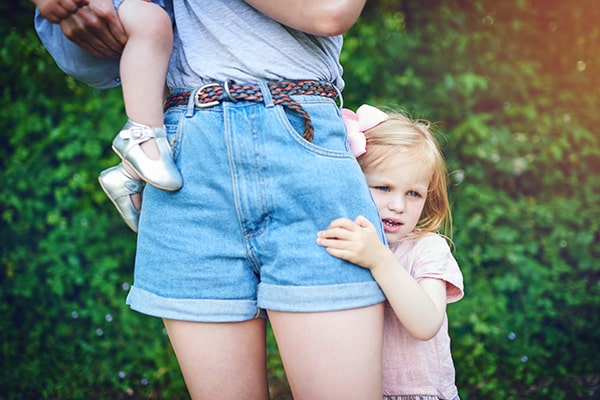How to Help a Shy Child Socialize
The do’s and don’ts of helping a shy child succeed
- 3 min read
- child development
- health & wellness

Shyness is a common behavior that most children will experience at some point or another during their developmental years. Children often become less shy overtime or may overcome this phase altogether. When it comes to helping a shy child socialize, it’s important to keep a few things in mind.
What Exactly is Shyness?
People often use terms like “shy” interchangeably with “social anxiety” or “introverted”, and this is typically not accurate. Shy children often feel awkward in social settings and fear being judged. Social anxiety is a diagnosed disorder where the feelings of shyness tend to disrupt everyday life. Introversion, on the other hand, is completely unrelated to shyness or social anxiety but rather refers to a person’s preference for being alone or in small social groups instead.
It’s also important to remember that shyness isn’t necessarily a weakness. Modern society tends to be biased toward extroverted personalities so shyness can often be falsely perceived as a negative character trait when that simply isn’t true. In fact, shy children are often more observant, cooperative, compassionate, and have far more self-control.

The Do’s
- Practice social skills. Some children feel very uncomfortable in new social situations so practicing in an environment where they feel safe can often increase their confidence. Giving your child a way to prepare will likely decrease anxiety.
- Arrive early for new social situations. By arriving early for any new social experience, shy children have an opportunity to warm up before others arrive.
- Listen to your child. Take in their concerns without being dismissive.
- Follow your child’s interests. If social activities focus on subjects or activities that your child is naturally drawn to, they are more likely to get involved without hesitation.
- Be a secure support system for your child. Reassure them that you will be there if they’re feeling nervous and remember that times might arise that call for exiting from an overwhelming situation.
The Don’ts
- Refrain from assigning a label to your child’s shy demeanor. If you, as a parent, label your child as shy, they are more likely to assume that role. Moreover, don’t allow others to label them either. Frame their personality as “reserved” or “not talkative”.
- Don’t overprotect them or coddle them during challenges. If children are overprotected, it sends a message that their fearful reaction was justified.
- On the other hand, don’t overly force them into situations. Forcing a child into an overwhelming social situation will only further distress them. Remember that the pace might be slow at first.
- Most importantly, don’t worry about shyness too much. Everyone doesn’t need to be an over-the-top extrovert and having a few key relationships can still lead to a fully developed and fulfilled life.
Be sure to discuss all of these strategies with your co-parent so that you present a unified front when dealing with your child’s shyness. Communication is vital to your child’s success and TalkingParents features like Secure Messaging and Accountable Calling℠ allow for co-parents to always be on the same page concerning their child. The Shared Calendar feature also allows co-parents to be in sync on their child’s social functions, or the Info Library can easily store notes regarding successful tactics for dealing with your child’s shyness.
Keep in mind that the stress of divorce or separation can have a great impact on a child, and some of these behaviors could be a direct result of that, especially if the divorce is recent. During the first year following separation, children are likely to experience emotions like distress, anger and anxiety. They might also retreat inward which could present itself as shyness. Maintaining a peaceful homelife can greatly help combat these feelings and could even prevent them altogether.
However, if you find that your child’s development is being hindered by their shyness, there may be a deeper seeded issue. They could be suffering from true social anxiety, and consulting with a child therapist could prove beneficial. Be sure to discuss with your co-parent regarding seeking professional help as they will be integral in guaranteeing your child’s social and emotional growth.